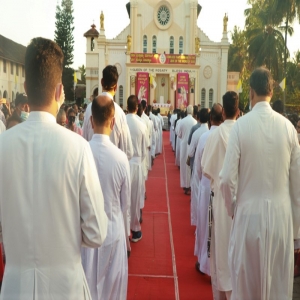
.png) M L Satyan
M L Satyan
I was intrigued by the revelations Bishop James Thoppil of Kohima, chairman of the Northeast Bishops' Formation Commission, made during the meeting of the formators of the northeastern region held from October 21-23, 2024, at Mount Tabor Retreat Centre in Dimapur. He placed the priests under four categories:
a) 10% of priests who excel in their service
b) 20% of priests who perform adequately
c) 20% of priests who are just average
d) 50% of priests who are irrelevant in their roles
These observations raise a serious question on the quality of priestly formation today. Based on my experiences of visiting formation houses and conducting sessions, I suggest certain formation changes which could positively impact the priests.
I begin with an actual incident. Once, I was conducting sessions for the final year theology students (all of them Deacons). As I started the post-lunch session, I wished them, "Good afternoon! Hope you all had a good lunch and rest." One student said, "No, Sir!" I went close to him, touched his shoulder and asked, "Are you not well?" He replied, "Sir, we will rest only after the ordination."
Look at his answer! Tamil has a proverb: "Testing one rice is enough to know whether the potful of rice is cooked." This one statement of one priestly candidate speaks volumes about the present mindset among the seminarians. I am not making a generalisation. There could be some students with the right motive. However, this student's attitude is quite prevalent among the majority. This mindset cannot be waived.
Today, the trend among seminarians is to pass the exams by hook or crook. During the formation, their only aim is "ordination to the priesthood." In this process, politics among the professors, favouring some unfit students for their selfish agenda, cannot be ignored.
Once ordained priests, they aim for 'wealthy parishes' and 'powerful positions' like Director, Treasurer, Secretary, Vicar Forane, Rector, Dean, etc. During formation, they "struggle" (!?) and do "hard work" (!?) for 8 to 10 years, and then they "rest" and "relax" for the rest of their lives. This is the sad state of affairs today.
Suggested changes:
Recruit a candidate only after a strict screening procedure.
After the philosophy course, they could have a two-year break. In one year, they could do regency (as done presently). In the second year, they could return home, stay there, find a job, and earn a living.
After the theology course, they could do another year of regency before they are ordained as deacons. Only those candidates who are found fit could be ordained as deacons.
After being ordained deacons, the candidates could work as Public Relations Officers (PRO) of their respective dioceses for a year. After completing this work, they could be ordained as priests.
During formation, special focus must be given to subjects such as psychology, sex education, personality development, interpersonal relationships, public relations, counselling, peer support etc.
A "Peer Support System" could be created for seminarians and priests and monitored systematically. This is essential for both diocesan and religious priests.
The main drawback in the present-day formation is the "alienation from one's family." As soon as a student is recruited and joins the seminary, the "mindset" and the "lifestyle" of the student change. A student who used to sleep on the floor and eat with his hands at home is made to sleep on the bed and eat with a spoon and fork in the seminary. He gets used to other comforts of life, such as timely food, spacious accommodation with fans and ACs, transportation, pocket money/allowance, etc.
In the past, Christian missionaries sacrificed their comforts, came to India, and lived like Indians. Whereas the Indian priests today live like foreigners. This is the irony. In some areas of the tribal region, many seminarians are not quite enthusiastic about visiting their native villages (usually located in the interior jungle) and living with their families during their annual or home holidays. Most prefer to stay with the parish priest in the parish house.
I had met one seminarian who was spending his home holidays in a parish house. The reason was that he had to walk 3 kilometres into the jungle to reach his home. So, his parents came to the parish house to meet him. The same seminarian used to walk this distance daily to study in the parish school. Being a seminarian, he was "reluctant to walk." What a change!
Such incidences are witnessed in southern parts of India, too. Seminarians from rural areas belonging to lower-middle-class families rarely go home and stay. They probably consider visiting home "beneath their status"! The sad story is that the 'gap' between the seminarians and their families widens as the years pass. When he becomes a priest, he goes home as a "special guest" and that too for a short period, provided the required comforts are given to him. The old "bond with family" that existed in the past is no more! Many priests get cut off from their families for personal reasons. To a great extent, this also contributes to their 'loneliness.'
Among non-Roman Catholic churches, we find married pastors. Such pastors are found to be "more mature in their pastoral work" than Roman Catholic priests. This is the reality whether one accepts it or not. It is also to be noted that the pastors' wives play a crucial and supportive role in pastoral activities. The people fondly call the pastor-couple "Pastor Aiya" and "Pastor Amma" in the southern states. That reveals the close bond that exists among them. Clerical sexual abuse seems to be absent among them. When will the Catholic Church learn this lesson from them?
Last but not the least. The suggested changes must be studied, debated and scrutinised with an "open-mind". The need of the hour is a paradigm shift and a change of clericalism.